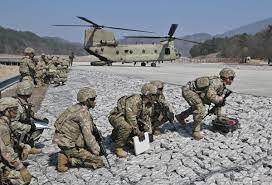China has often blamed the US military drills for surging tension in the Korean regime. This is because China views the US military presence and activities in the region as a threat to its security interests. China has been a key ally of North Korea, and has been critical of the US and South Korea's joint military exercises in the region.
China believes that the US military drills are a provocation and a show of force that could escalate tensions in the Korean regime. China has argued that the US should avoid actions that could be seen as provocative, and should instead engage in dialogue and diplomacy to resolve the issues in the region.
China has also been critical of the deployment of the Terminal High Altitude Area Defense (THAAD) system in South Korea, which it sees as a threat to its own security. The THAAD system is designed to intercept and destroy short- and medium-range ballistic missiles, and is seen as a key component of the US's missile defense system in the region.
China has argued that the deployment of the THAAD system could upset the balance of power in the region, and could lead to an arms race in which other countries seek to develop their own missile defense systems.
In addition, China has been critical of the US's policy of maximum pressure on North Korea, which involves imposing economic sanctions and increasing military pressure in an effort to force North Korea to abandon its nuclear weapons program. China has argued that this policy is counterproductive, and has called for a more diplomatic approach to resolving the issues in the region.

In conclusion, China's criticism of the US military drills in the Korean regime is based on its concerns about the US military presence and activities in the region, and its belief that these activities could escalate tensions and threaten its security interests. While the US has argued that its military presence in the region is necessary to deter North Korea and ensure regional security, China has called for a more diplomatic approach that emphasizes dialogue and cooperation. The issue of the US military presence in the region is likely to remain a contentious one, and will require ongoing diplomacy and dialogue to address.